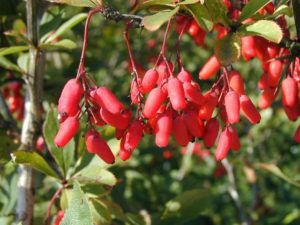Berberis vulgaris L., also known as common barberry, European barberry or simply barberry, is a shrub in the genus Berberis. It produces edible but sharply acidic berries, which people in many countries eat as a tart and refreshing fruit.
Contents
Uses
The use of the plant in traditional medicine has been limited by the bitter taste of the bark and root. However, numerous folk medicinal uses for barberry exist. Other reported uses of M. aquifolium include the treatment of fever, gout, renal and biliary diseases, rheumatic symptoms, diarrhea, gastric indigestion, and dermatosis.
Berberine, the active ingredient in barberry, inhibits the growth of bacteria and has antioxidant properties in vitro. Barberry extract may also improve symptoms of certain skin conditions, although more research is needed to confirm these findings.
Barberry fruits have been used in the traditional Austrian medicine internally as tea, jelly or syrup for treatment of disorders of the respiratory tract, fever, infections, cold, and flu.
Benefits
Berberine is possibly an immune system stimulant and helps with digestion and gastrointestinal pain. It is found in the stem bark and rhizome of the plant. Berbamine is another alkaloid found in the herb and is thought to fight infections by stimulating the action of white blood cells.
This medicinal herb has been used for more than 2500 years in Asia and the Mediterranean. In ancient Egypt barberry was used as a preventative against plague. The Ayurveda healers of India used it as a remedy for dysentery.
Barberry has traditionally been used as a treatment for digestive disorders, skin irritations and lesions. It has anti inflammatory and antibiotic properties and has been used in the treatment of urinary tract and bladder infections, upper respiratory infections and abnormal uterine bleeding.
It may be beneficial to the cardiovascular and neural systems and may be used as a treatment for epilepsy and convulsions. It has also been used as an alternative treatment for tachycardia and hypertension.
Barberry extract used in a salve may reduce symptoms of psoriasis, but there is currently not enough clinical evidence to support this claim.
It is commonly used to treat bacterial diarrhea and parasitic infections of the intestines.
It is also used to treat fungal infections such as candida (yeast).
Additionally it may aid in digestion and prevent some symptoms of indigestion such as heartburn and nausea.
Like its cousin oregon grape, barberry is thought to stimulate blood flow to the liver and improve liver function. It is also believed to stimulate the secretion of bile.
Cautions
As with other herbs containing berberine, barberry should not be used by pregnant women because it is a uterine stimulant. No studies have been done on the safety of it in nursing women and therefore it is probably best to avoid using it while nursing.
Used in appropriate doses, barberry has no reported side effects. In excessive doses it may cause nosebleed, diarrhea and vomiting. It may also cause kidney problems. Pain during urination, blood in the urine and low back pain are symptoms of kidney problems and should be reported to a doctor immediately.
This herb may interact with other medications, so it is important for patients to advise their doctor if they are taking this it. Patients who are under the care of a doctor and taking prescribed medications should not take it until they have discussed it with their doctor. Before taking barberry as a remedy, patients should discuss the medical condition and therapeutic benefits with a doctor or herbalist.
Interactions
None are recorded.
Other names
Mountain grape, pepperidge, berberry, common grape, common barberry, European barberry
References
Source: HerbalSupplementResource, http://www.herbal-supplement-resource.com/barberry-herb.html
Wikipedia, https://en.wikipedia.org/wiki/Berberis_vulgaris#Other_uses

